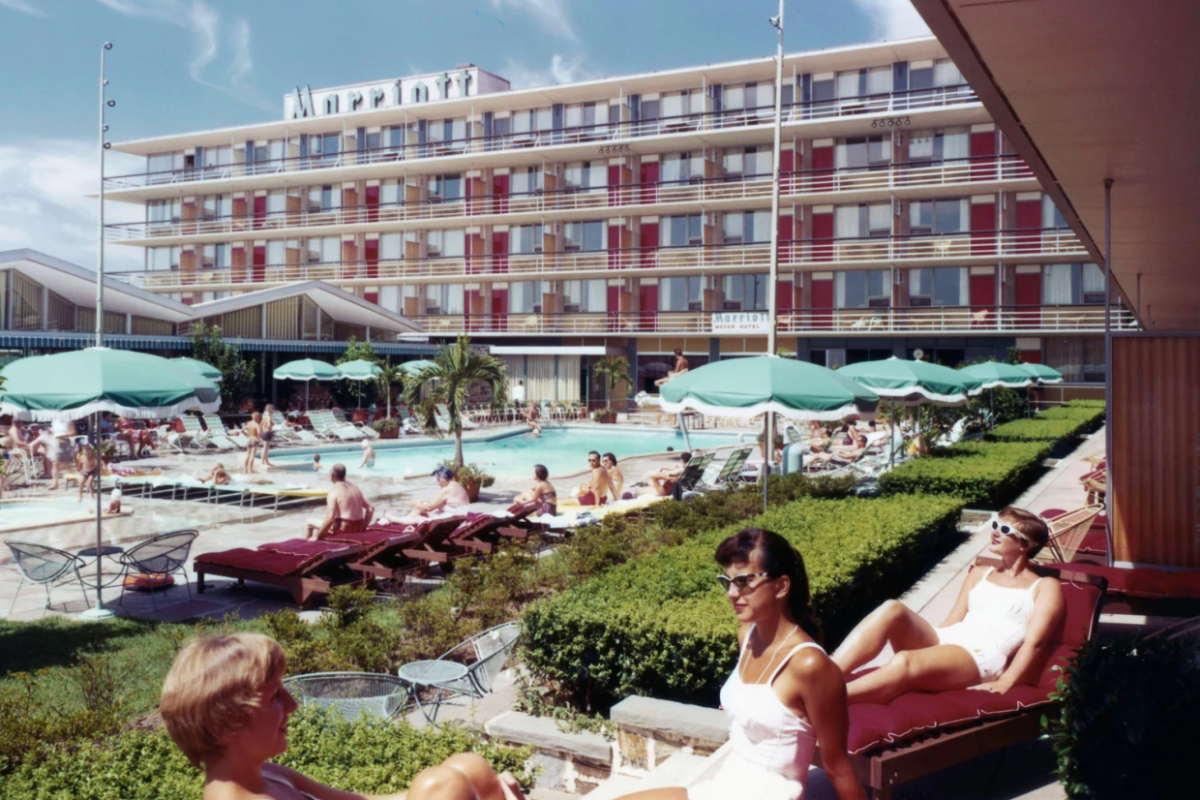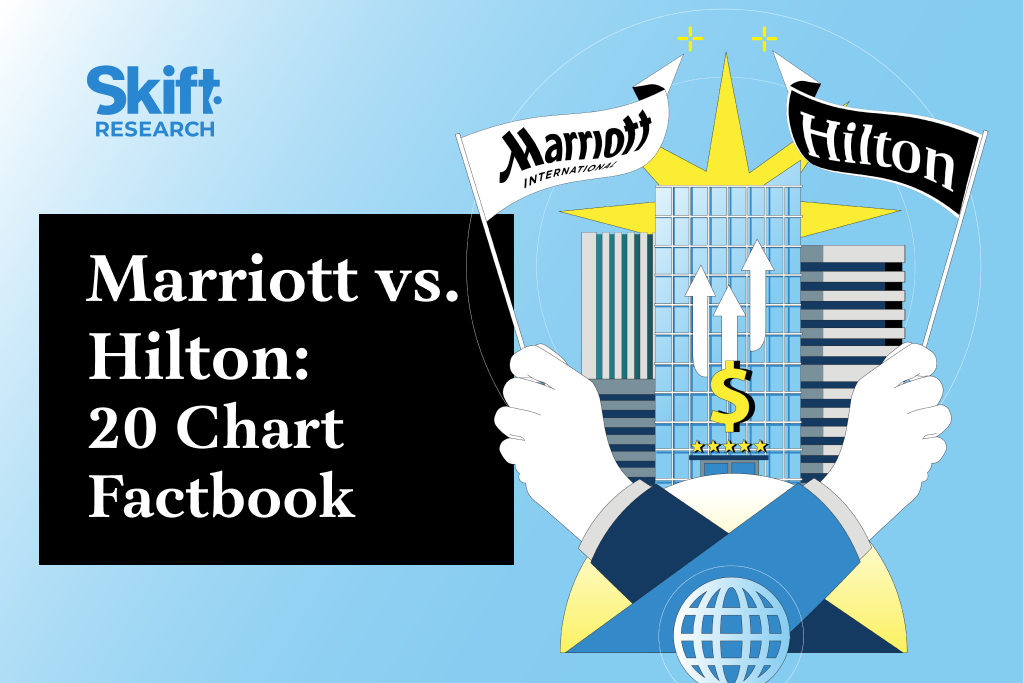Skift Take
At heart, the hotel business is an old-fashioned affair. That's precisely why histories of titans like Hilton and Marriott can be so valuable. Lessons from past crises can shed light on today's dynamics.

Skift Global Forum was held in New York City on September 26-28, 2023. Read coverage of the event at the link below.
We learned a lot about hotel sector history by listening to Hilton vs. Marriott — the latest season from Business Wars, a show from Wondery, Amazon’s podcast studio.
The five-episode series dramatizes pivotal moments in the companies’ trajectories. The scripts are well-researched, and the production values are high. Perhaps that shouldn’t have been a surprise, considering that Business Wars won the “best business podcast” award in this year’s Ambies.
Accidental Hoteliers
Host David Brown uses the opening episode to lay out the origin stories of the Hilton and Marriott empires.
It turns out that J. Willard (“JW”) Marriott, founder of the world’s largest hotel company, didn’t have his sights set on the hotel business. A colleague suggested the idea of entering the hotel sector as a way to expand beyond the company’s core of fast-food restaurants and catering. In 1957, Marriott opened its first hotel, three decades after the company’s founding.
Similarly, Conrad Hilton also entered the sector somewhat by chance. In 1919, he wanted to buy a bank in a Texas oil town, but the deal fell through, and he was amazed by the popularity of the town’s hotel. After checking the hotel’s books, he bought it essentially on the spot.
Skift Take: One of the most appealing things about the travel sector is that it has long welcomed innovators. Many of today’s disruptors should take heart from the humble beginnings of Marriott, whose company now has more than 1.5 million rooms, and Conrad Hilton, creator of Marriott’s closest U.S. competitor.
Financial Engineering
Conrad Hilton became more ambitious with time, but he faced a problem plaguing the whole sector in the mid-1920s. New construction is capital-intensive, and it’s difficult to get loans. To build his first truly new hotel, Hilton needed $1 million but only had about a tenth of that. So he asked to take a 99-year lease on the land — instead of buying the land outright — and then took a loan against the land to underwrite construction costs. Clever! The deal became a template for growth.
In episode two, the show covers how JW Marriott’s son, Bill, expanded the business. Bill hired financial wizards, and in the late 1960s, they invented the asset-light business model.
Under the asset-light model, big brands mostly run hotels through management or franchise contracts. Once they become hotel management companies, they can avoid the need for holding lots of capital to own buildings and land. The model enables the brands to scale up more quickly.
Since then, Marriott’s success in moving asset-light has been copied by Hilton and nearly all the other major hotel players.
Yet debt-based businesses are prone to getting caught off guard by changes in macro-economic fortunes. The Great Depression essentially bankrupted Hilton, though the podcast dramatizes how Conrad Hilton managed to claw back control of hotels through sheer force of will.
Skift Take: Conrad Hilton’s and Bill Marriott’s innovative capital structures enabled his company to scale more quickly than any hotel company previously. Yet financial wizardry can be dangerous in the wrong hands. When lodging companies (think: Selina, Oyo) have at times essentially used revenue as the basis to underpin fat loans, bad outcomes become more likely.
Why Marriott Sells Pepsi
Bill Marriott let his company load up on debt in the 1980s to fuel growth, but servicing the debt became difficult when economic circumstances changed.
In episode three, we learn that the Marriott company got so hard up for cash to service debt and other needs that it hit up Coca-Cola, its long-time partner, for a loan of about $50 to $100 million. Coca-Cola declined, while Pepsi offered the money. Since then, Marriott properties have served Pepsi beverages. The contract was renewed on a 20-year term in 2018.
Skift Take: Sometimes, a travel company is its own worst enemy. This podcast series makes clear that it was internal infighting and fateful decisions that often caused the most problems for these giants rather than external competition. You wouldn’t think people smart enough to build companies like Marriott and Hilton would paint themselves into corners through strategic mistakes. But they do.
Culture Eats Strategy for Breakfast
Episode four touches on the Hilton versus Marriott rivalry from 2001 onward. One noteworthy slice is a faithful homage to a stellar 2014 Washington Post profile of current Hilton CEO Christopher Nassetta by Tom Heath. It covers how Hilton was adrift 15 years ago and how Nassetta made tough calls and turned the company around. The lessons can be relevant to travel company execs of all kinds.
To fix a broken company culture, Nassetta moved the company’s headquarters from Beverly Hills to McLean, Virginia, a suburb of Washington, D.C., and only brought 130 of the 600 employees at headquarters to the new location.
Skift Take: No matter how genius your strategic plan may seem, the odds are against its success if the prevailing corporate culture — shared values, assumptions, habits, and incentive structures — fight against it. The way Nassetta reset how Hilton’s team collaborates, approaches problems, and treats guests not only reshaped Hilton but became a model for other travel companies.
Airbnb Waits in the Wings
One of the unintentional comedies of the Business Wars podcast is that one of the advertisers is Airbnb, with host David Brown encouraging listeners to consider becoming short-term rental hosts.
Coincidentally, Airbnb this month will join the S&P 500 stock index, signaling its arrival at the head table of corporate giants. Marriott joined in 1997 and Hilton in 2017.
Skift Take: At the end of this podcast series, the Hilton and Marriott empires seem like unstoppable giants. Yet there’s always a whitespace for a disruptor in travel.
Have a confidential tip for Skift? Get in touch
Tags: future of lodging, hilton, marriott
Photo credit: The swimming pool at the Twin Bridges Marriott, in Arlington, Virginia in the 1950s. John Willard Marriott and Alice Sheets Marriott opened their first hotel _ the Twin Bridges Motor Hotel in Arlington, Va. But it was their son Bill who transformed the company into a global hotel giant.

